A group of Nagorno-Karabakh war veterans (the former commanders of volunteer groups) has urged President of Armenia Serzh Sargsyan to behave as a winner during the Nagorno-Karabakh peace talks, to decline the proposed documents and to answer the question "Why is Russia so much interested in their approval?"
Appearing at a press-conference Thursday on behalf of thousands of their comrades, the leader of the Goyamart party Seryozha Ghazaryan, the president of the Union of Glorious Warriors Grisha Sargsyan and the president of the Union of Nagorno-Karabakh Veterans Yura Mikaelyan expressed concern for the current situation over the Nagorno-Karabakh peace process.
"We demand that the Armenian President and the world community should renounce the three basic settlement principles: territorial integrity, a nation's right to self-determination and nonuse of force, and should further negotiate according to relevant legal documents. There are specific documents saying that Highland (Nagorny) Karabakh and Lowland Karabakh were annexed to Azerbaijan. For the moment, we have liberated just part of our territories.
Consequently, it is the Azerbaijanis rather than we who must give territories back as Azerbaijan is the legal successor of the Azerbaijan Democratic Republic (1918-1920), a country than never comprised either Karabakh or Nachichevan," Ghazaryan said.
He said that Armenia will start exchanging - rather than ceding - territories only if Azerbaijan recognizes Nagorno-Karabakh's independence. "We, just like the whole Armenian nation, object to unilateral concessions," Ghazaryan said.
He pointed out that the Armenian President must not act contrary to his Constitution and people if he considers himself a president. "We are ready to repel the enemy and to fulfill all the President's orders," Ghazaryan said.
ARMENIA-VETERANS-POSITION
ARMENIA-VETERANS-POSITION







